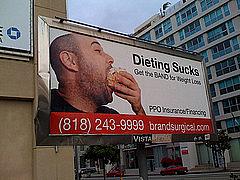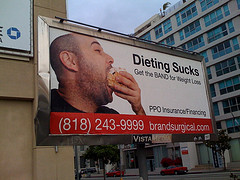Q&A with Dr. Scott Bickman, Part 3: Lap-Band clinics are money machines for the owners

 Where does a doctor who has found himself in trouble go to find work?
Where does a doctor who has found himself in trouble go to find work?
Antidote had talked with Dr. Scott Bickman for more than an hour recently when he mentioned "the Omidis." (Here are Part 1 and Part 2 of our interview.)
Bickman, an anesthesiologist, had been put on probation by the Medical Board of California following a patient death. He started working with Dr. Harrell Robinson at the Anaheim Hills Surgery Center, only to become one of the subjects of a U.S. Drug Enforcement Administration (DEA) investigation into a painkiller mill.
When he left Robinson, he found an open door with the weight-loss clinics owned by Julian and Michael Omidi. These are the doctors behind the 1-800-GET-THIN and "Dieting Sucks" campaigns whose billboards have become a visual blight on Southern California, promising people a quick, low-risk way to shed pounds through Lap-Band surgery.
The Los Angeles Times has documented the deaths of at least four patients who had surgery at those clinics, and one of the deaths has been blamed on the anesthesia care by Dr. Daniel Shin. The Omidis are having trouble getting their insurer to pay some of the families suing them for false advertising.
Perhaps not surprisingly, Bickman did not have much good to say about his experience with the Omidis. The first two parts of my interview with him ran on Friday and Tuesday. The final part is below. It has been edited for space and clarity.
Q: What did the DEA first ask you when it contacted you?
A: Here's what I want to know. Why does it take them eight months from January all the way until November to finish their job? What investigation could they possibly need to do for that long? They were going to his office and served a search warrant. Why didn't they serve a search warrant on me? Everyone in this case was served a search warrant except me. Why not?
Q: Why do you think that is?
A: They purposely didn't want to prove or disprove anything to do with me because they knew it would hurt their case. If I had run the case, I would have been stopping him after month number one. I have four small children, and I would have wanted to know where those drugs were going. When I asked my lawyer to ask the investigator where the drugs that Robinson was buying went, they said they didn't know. If they don't know where these drugs went, what kind of investigation did they do? Any time there's diversion of drugs, it should be shut down immediately. Yet this thing went on for eight months in 2008 after all the information they had gathered in 2007. The Harvard Group notified the DEA every time an order for hydrocodone was placed, but the DEA did nothing.
Q: Robinson also paid another doctor who let him use his DEA registration. Did you know Dr. Thomas Mitchell?
A: I never met him, and I don't even know him. He was a disaster if you look at the records. He was a train wreck waiting to happen. The poor guy has had one thing after another go wrong. He would be looked at as needing the money. I didn't need the money. That's for sure.
Q: What about Dr. Joy Johnson, who actually owned two of the clinics Robinson was running? What motivated her to allow Robinson to use clinics?
A: I don't even know her. Who the hell is she? I don't know why she would let him run those clinics. I never heard her name until I saw your article.
Q: Now that you have lost your DEA registration, what are you doing for work?
A: I can still work. I still have my medical license. After I stopped working with Robinson, I spent about two years doing anesthesia for Lap-Band procedures. I was working for the Omidi brothers, who I know have gotten some bad publicity.
Q: They have. How many procedures did you do for them?
A: I'm not sure exactly, but my numbers are pretty high. I've probably done between 1,500 and 2,000. I know for a fact that I have more experience than anyone in southern California. Most anesthesia providers won't get involved with Lap-Bands because they are very difficult cases. I had to take what I could get. Do you think when I got off probation that I would keep working with the Omidis? No way. Once I got off probation, I was out of there.
Q: What makes Lap-Band procedures so difficult?
A: They're just hard cases. There's a lot going on, and it's tough to maintain people at the right levels. I've had multiple people flat-line on the table, but all of them were fine. You have to know what you are doing. The reimbursement is really high for these procedures, but the risk also is high. I just figured that I've done everything right, and it's ended up being disastrous, so why not be reimbursed for taking some risk?
Q: Did the Omidis find you or did you find them?
A: The same CNRA with the accreditation business had worked for them. One of the doctors who worked at one of their clinics insisted on having a board-certified anesthesiologist. I filled in for him, and then I came back to do another one and they just railroaded me into it. They had me scheduling cases all of the time. At that point, it was fine. I started at one clinic and then worked at the Beverly Hills clinic.
Q: When was it not fine anymore?
A: I just stopped working there because there were policies I was not OK with.
Q: Like what?
A: Like the fact that I made them a lot of money, but I also took all the risk. I worked every Saturday, and I put in a lot of time for them. Things just weren't the way they should have been.
Q: What were they were getting paid?
A: They make about $3,300 per procedure, the whole thing. I would get paid $300.
Q: They made 11 times what you were making?
A: Basically. The hourly rate was $200, and I could do one in about an hour and a half. I would have five or six patients a day. I just had to work harder to earn more. At a certain point, though, when I wasn't on probation with the medical board anymore, I just said, "Forget it."
Q: So why aren't you working anywhere now?
A: Because of this thing with the DEA. I had been working at another plastic surgeon's office in Beverly Hills and out in the Valley twice a week. Now I'm not doing anything. I'm sitting at home. Nobody will have me come to work for them anymore. Everyone is worried if something happens and they had someone in their office who was knocked by the DEA they would be sued. It sounds terrible, but it's true. Even though there is nothing from the Medical Board of California that is restricting my ability to practice, I still can't find work. Usually the state acts first and then the DEA, but the state never did anything.
Q: How did people even find out that you had lost your DEA registration?
A: I had to supply my credentials. I am not going to lie to people. Working in plastic surgery, these people have relationships with their patients and their reputations would be totally marred if it came out later that I had been working there and didn't disclose this. It would be putting them in a position where they would be blindsided by something. That's not OK with me, either. I'm not hiding anything. I don't feel sorry. I don't feel remorse because I didn't do anything. The system totally broke down. The DEA failed. They failed the public, and they failed me.
Q: When you say you don't feel sorry, do you mean that you don't feel sorry that because Dr. Robinson was allowed to keep practicing using your DEA registration he ended up operating on Maria Garcia and she ended up dying as a result?
A: My DEA registration did not allow Robinson to keep practicing. A totally corrupt system let Robinson be put in a situation to negligently kill Ms. Garcia and to cover up the truth, of course. Not me. The fact that Ms. Garcia died at this center, that is awful. The fact that the coroner said it was a therapeutic mishap, that is awful. It was gross negligence. You have it right in terms of what happened the way you wrote about it, but you don't know all the details. The coroner got that call wrong.
Comment or question? Post in the comments below or email me directly at askantidote@gmail.com.
Follow Antidote on Twitter @wheisel.
Related Posts:
The Shadow Practice: Disciplined doctor found an exile community in immigrant health care
The Shadow Practice Part 2: New owners can't exorcise ghosts of clinic's past
The Shadow Practice Part 3: Immigrant clinic had deep roots in deception
The Shadow Practice Part 4: Doc begs patients for loans
The Shadow Practice Part 5: Drug pushers running this clinic were far from saints
The Shadow Practice Part 6: Doctors sell their souls, and their licenses, on the cheap
The Shadow Practice Part 7: Punishment for drug-dealing doctors more severe in Arizona
The Shadow Practice Part 8: How one California clinic became a magnet for bad medicine
The Shadow Practice Part 9: Woman dies during cosmetic surgeries at unlicensed clinic
The Shadow Practice Part 11: Joint Commission overlooks risky practices that led to patient death
The Shadow Practice Part 12: Patient safety net still in tatters three years after court ruling
California governor and medical board should stand accused in patient's death
Andrew Rutland: California doctor accused in repeated patient deaths surrenders license

